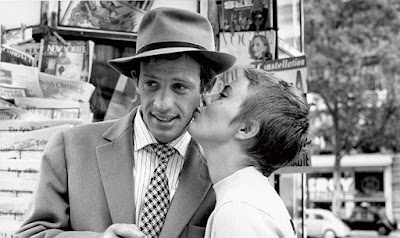By James V. Ruocco
Still, it’s astonishing to see the filmmaker weave as fascinating a narrative about yet another group of people living on the edge of reality who’ll do almost anything to survive while grappling with the mysteries of the heart, soul and mind.
Here, as in his later films, the universe of “La Strada” is populated with parasites, freaks, romantics, urchins, grifters, circus clowns, trapeze artists and loose women. All of them, of course, have their shortcomings, spiritual temptations and secret confessions including Zampano (Anthony Quinn), a circus strongman who treats women like dirt; Gelsomina (Giulietta Masina), the childlike waif who becomes his companion and carnival accompanist; and the Fool (Richard Basehart), the sweet-natured clown whose good intentions eventually lead to his untimely doom.
Those who love Italian cinema will find plenty to like here.
Then again, what’s not to like?
Here, before us all is a work by the master himself: Federico Fellini, one of the greatest international filmmakers of the 20th century. It is with “La Strada” that Fellini won major recognition. The film not only won the Academy Award for Best Foreign Film, but it prompted critics to invite comparisons to DeSica, Antononi, Truffaut and Renoir.
A departure from his neo-realist roots, “La Strada” finds Fellini discovering the religious metaphors, surrealistic blueprints, humane eloquence, buried tragedies, operatic pathos and the raw allegories that became his cinematic trademark.
An expert storyteller, he finds amusement and sadness in the troubled plight of the film’s three central characters and their broken dreams. But you’re never quite sure what road the story will take, a conceit that gives “La Strada” its mesmeric humanity and its element of surprise.
Much has been said about the final scene on the beach, which finds Zampano sobbing uncontrollably as he seeks redemption for his sins. Briefly gazing up at the sky for answers, this moment is haunting, bewildering and unbearably moving. It is one of those important cinematic moments that linger long after the film has ended. And yes, it is pure Fellini at the top of his game.
Two minutes earlier, another ball is dropped: the fate of Gelsomina. Her portrayer, the wonderful Giulietta Masina, brings a Chaplinesque spirit and pathos to the part. Masina's natural, doe-eyed trademark wonder and desperate attempts to please the thuggish brute (unforgettably played by Anthony Quinn) she secretly loves and desires, is imbued with a haunting simplicity that only an actress of this caliber could master.
Her spirit, her energy. her infinite range and her emoted freeness is so gorgeously human, it's impossible to take your eyes off her for a moment. As director, Fellini captures that intrinsic, on-screen magic and utilizes it to full advantage. In return, the character becomes an aching reminder of living pathos, crying and smiling with bewildered, natural abandon. Simply and utterly, beautiful.
"La Strada" is a profound, compassionate drama that portrays Fellini's thematic preoccupation and obsession with reality, fantasy, superstition, magic, alienation, rebirth and fabulous absurdity. It is a very personal, remarkably honest film built upon a number of symbolic scenes, social contrasts, brash moralities and that never-ending search for love and perfection. It is also an important work of Italian cinema and one that has withstood the testament of time.
The story, its appeal, its visual power, its influences, its theatricality and its continued generated buzz is no fluke. This is Fellini, Federico Fellini, a filmmaker and dreamer whose cinematic works continue to mesmerize, excite and elicit important conversation. "La Strada" gives us that, and so much more.
"La Strada" stars Giulietta Masina, Anthony Quinn, Richard Basehart and Aldo Silvani. Directed by Federico Fellini. Written by Federico Fellini, Tullio Pinelli and Ennio Flaiano. Running time: 1 hr. 48 min. (1954) (Trans Lux Inc./Ponti-De Laurentiis Cinematografica)







